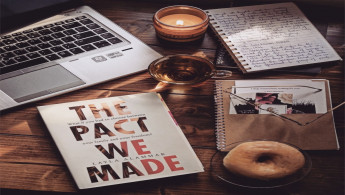Ramadan book club: 15 must-read Muslim novels to enjoy over the holy month
It's a small sacrifice to make for the wellbeing of our communities, but that doesn't mean we don't feel lonely or disappointed.
While we miss getting together for iftar and prayers, a quieter Ramadan has allowed us to carve out some extra time for personal reflections and pursuits.
So, if you find yourself with a free hour or two, and whether you're a Muslim or not, these books by or about Muslims will be great company.
The Moor's Account by Laila Lalami
Lalami's unique and layered historical fiction novel was a finalist for the Pulitzer Prize in 2015. It's written from the perspective of Mustafa Al Zamori, a black Muslim man who was enslaved by the Spanish and renamed Estebanico.
Lalami's phenomenal novel is a tribute to the power and importance of storytelling, and it is the reclamation of a voice silenced in history.
Mustafa Al-Zamori was an actual individual who existed, but whose version of the Narvaez expedition of 1527 was reduced to a single line.
Lalami's intensive research of real accounts and documents led to this fictionalised and imagined version of Mustafa's experience – it's a powerful work that works against the erasure of the first black Muslim explorer of the country now known as America
The Family Tree by Sairish Hussain
One of the best debut novels to hit the shelves in 2020, The Family Tree by British Muslim author Sairish Hussain is the story of a Pakistani Muslim family in Britain who are struggling to recover after a tragic event has driven the members apart.
The beautifully written and introspective family drama touches upon some of the most relevant social issues faced by modern Muslim communities.
From post-9/11 Islamophobia and substance abuse to mental health and grief, Hussain's novel is an all-encompassing experience that will keep you turning the pages. And most of all, it depicts the kind of wholesome father-daughter relationship that we've all been looking for.
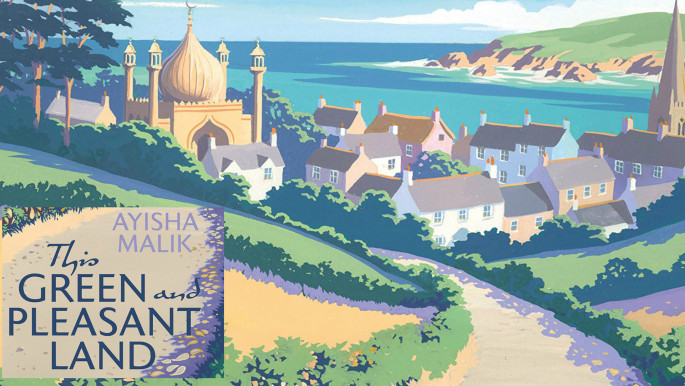 |
| Read The New Arab's review here |
This Green and Pleasant Land by Ayisha Malik
Ayisha Malik's most recent novel is set in a quintessential English village and explores the contemporary concerns of identity, racism and inclusion faced by British Muslims.
Fractures and fault lines begin to appear in this perfect small town when Bilal, an unassuming British Muslim man, decides to build a mosque to honour his mother's dying wish.
Matters are complicated further when Bilal's proudly Pakistani aunt, who doesn't speak English, moves in with Bilal's small family. It's a quietly reflective and moving novel, expertly plotted and driven by a cast of unforgettable characters.
The Girl in the Tangerine Scarf by Mohja Kahf
In Mohja Kahf's novel, Khadra Shamy is a Syrian Muslim girl who grows up in Indiana in the 70s. We follow Khadra's journey from childhood to adulthood, growing up torn between her Syrian and American identities, and grappling with the highs and lows of faith.
Kahf's compelling bildungsroman is a must-read story that captures the complexity of being a Muslim American.
The Beauty of Your Face by Sahar Mustafah
The central character of Sahar Mustafah's novel The Beauty of Your Face is Afaf Rahman, the daughter of Palestinian immigrants in America.
The novel's dual timeline portrays two versions of Afaf: The younger years growing up in a dysfunctional family where the eldest daughter has gone missing, and present day Afaf who works as a principal at a Muslim girls' school in Illinois, which is in the midst of a terror attack.
Mustafa's novel powerfully captures Afaf's personal journey of growth, particularly her relationship with her faith, family and Arab and American identities.
We Are All Birds of Uganda by Hafsa Zayyan
Hafsa Zayyan's family saga oscillates between present day London and 1960s' Uganda.
Through Sameer and Hasan's intricately woven and emotional stories, Zayyan explores the little discussed expulsion of East African Indians from Uganda.
A novel depicting displacement and effects of colonialism, We Are All Birds of Uganda is a stunning work about characters divided by generations and geography, but united by a common thread.
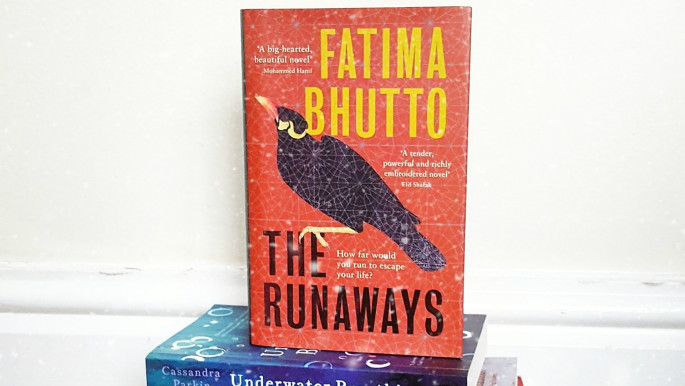 |
| Read The New Arab's review here |
Fatima Bhutto's thought-provoking novel The Runaways explores the heavyweight theme of 'radicalisation' by presenting three young characters who become ensnared by dangerous ideologies.
The power of the novel lies in Bhutto's close examination of each individual's circumstance to understand what eventually causes them to leave the comfort of their privileged and promising lives, to join a radical terrorist organisation. It's a fascinating work that attempts to depict how the powerful prey on the vulnerable.
Mama Hissa's Mice by Saud Alsanousi, translated by Sawad Hussain
Saud Alsanousi's dystopian novel is a fascinating work featuring themes of friendship, rebellion and censorship.
The novel, told from the sensitive and self-aware perspective of Katkout, follows a group of friends who form a rebellion group in a near future version of Kuwait that is enduing a caustic civil war.
An alternative narrative thread in the novel is chapters from a censored novel written by the main character. Ironically, Saud Alsanousi's novel was banned in Kuwait, but the author successfully fought to lift the ban.
The Parisian by Isabella Hammad
Isabella Hammad's novel The Parisian offers a unique, Arab-centered perspective of the geopolitics of the 20th century.
The novel follows Midhat, a young Palestinian student who goes to France to study medicine around the time of the First World War.
The Parisian is an expansive novel that depicts Midhat's fractured sense of self as a man who adopts French culture, and grapples with a divided identity that is painfully affected by his awareness of being the 'other'.
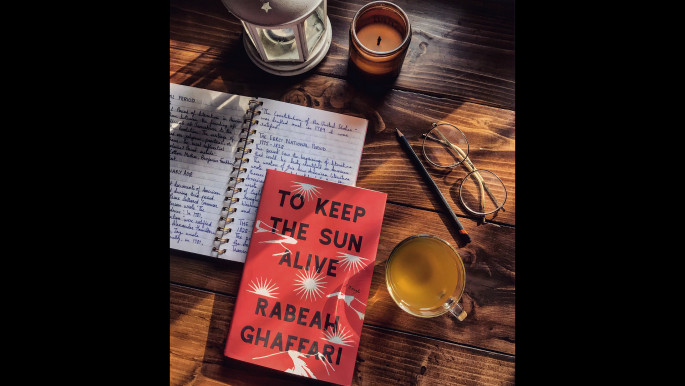 |
| Read The New Arab's review here |
To Keep the Sun Alive by Rabeah Ghaffari
Rabeah Ghaffari's novel depicts the caustic 1979 revolution of Iran through the lens of one Iranian family's experience.
The family functions as a microcosm of Iranian society as its members vary in their lifestyles and religious and political inclinations.
To Keep The Sun Alive is undoubtedly an exquisitely written novel, but it's most remarkable in the way it depicts all facets of the revolution and remains fairly unbiased.
The Baghdad Clock by Shahd Al-Rawi, translated by Luke Leafgreen
The Baghdad Clock by Shahd Al-Rawi is an endearing coming of age story set in Baghdad in the early 90s, during the first Gulf War.
In this atmospheric novel, two girls become best friends one night when they're seeking refuge in an air raid shelter.
Horrifying, emotional and imaginative – this novel captures some of the brightest and darkest moments of first love and surviving war.
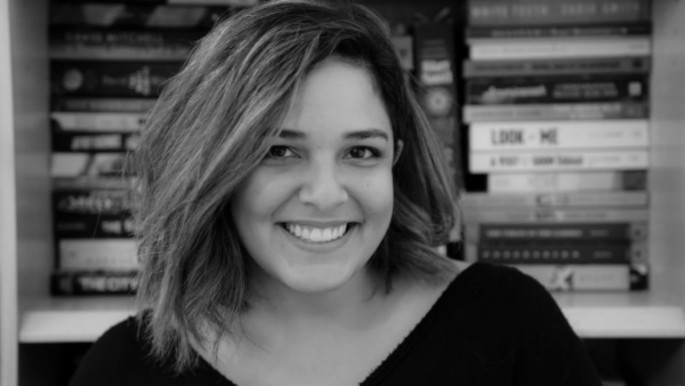 |
|
| Read The New Arab's interview with Layla AlAmmar here |
The Pact We Made by Layla AlAmmar
Layla AlAmmar's first novel is a multifaceted look at being a woman in contemporary Kuwait.
The country's commitment to modernisation allows the main character Dahlia to pursue a career, but the values and ideals of patriarchal society haven't loosened their grip on her life.
As the inner world of this complex female character unravels, the brutal reality of the choice Dahlia faces becomes clear. A compelling novel that portrays what its like to live with trauma in a community that is blind to it.
Set between Egypt and America, A Pure Heart by Rajia Hassib follows two Muslim Egyptian sisters who choose very different paths in life.
The novel's main character Rose is an Egyptologist who becomes obsessed with the mystery behind her sister's untimely death.
Going back and forth between the sisters – Gameela's life before her death and Rose's life after losing her sister – the novel explores themes of grief, identity, faith, immigration and the conditions that create revolutions.
Against the Loveless World by Susan Abulhawa
One of the best books of 2020, Against the Loveless World by Susan Abulhawa is a evocative novel about a complex female character who endures and refuses to submit to the narrative of victimhood.
Locked away in solitary confinement in an Israeli prison, Nahr reflects back on her life through the course of the story.
Her reflections reveal the life of a woman displaced many times and oppressed by patriarchy, society, misogyny and Israel's ruthless colonisation of Palestine.
Nahr's journey portrays her growth into a revolutionary who chooses life and the fight for dignity and liberation.
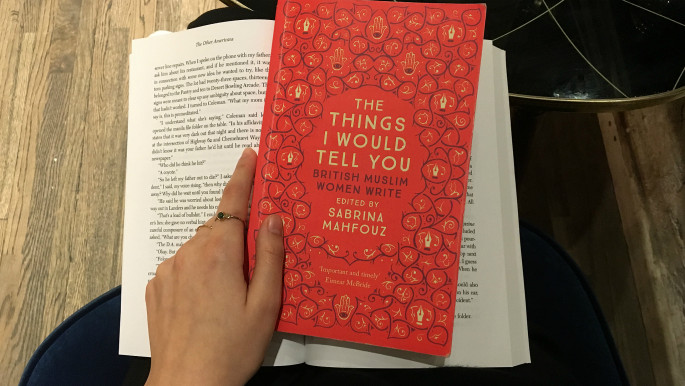 |
|
| Read The New Arab's review here |
The Things I Would Tell You edited by Sabrina Mahfouz
Edited by Sabrina Mahfouz, this brilliant anthology featuring a wide range of British Muslim women's voices challenges the Islamophobic and stereotypical image of Muslim women.
Set across time and space, the narratives in this extraordinary collection feature a wide range of genres and styles of writing.
Some of the notable works in this collection include Mezzatera by Ahdaf Soueif, Islamic Tinder by Triska Hamid, and Azra Tabassum's Brown Girl and Other Poems.
Sumaiyya Naseem is a Bookstagrammer and freelance writer and editor who specialises in Middle Eastern and Muslim stories. In 2019 she joined the Reading Women Podcast as a guest contributor to talk about South Asian and Middle Eastern narratives.
Follow her on Instagram: @sumaiyya.books
The New Arab Book Club: Click on our Special Contents tab to read more book reviews and interviews with authors:
 |
